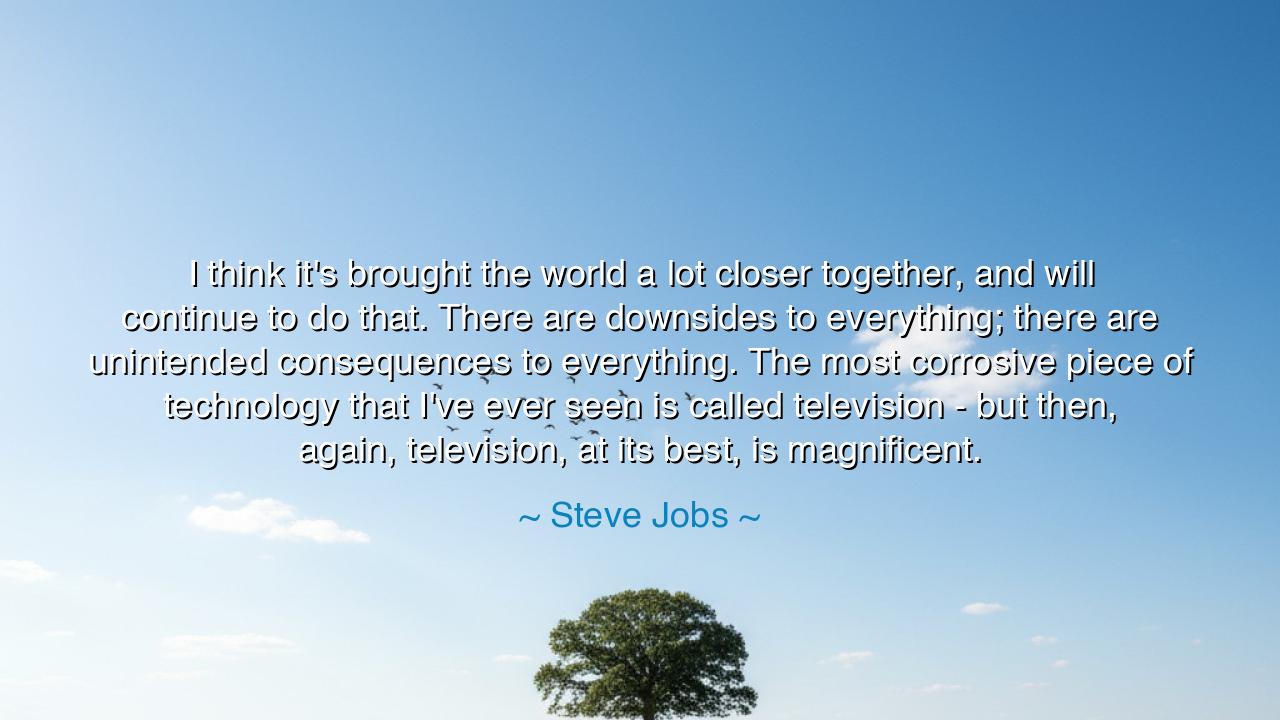
I think it's brought the world a lot closer together, and will
I think it's brought the world a lot closer together, and will continue to do that. There are downsides to everything; there are unintended consequences to everything. The most corrosive piece of technology that I've ever seen is called television - but then, again, television, at its best, is magnificent.






Hear the words of Steve Jobs, spoken as both marvel and warning: “I think it’s brought the world a lot closer together, and will continue to do that. There are downsides to everything; there are unintended consequences to everything. The most corrosive piece of technology that I’ve ever seen is called television—but then, again, television, at its best, is magnificent.” In this saying, we are confronted with the dual face of invention: the power to unite and the power to erode, the gift to uplift and the danger to corrupt. It is as if Prometheus himself had returned, bearing fire once more, and whispering to mortals, “Handle this flame with care.”
For Jobs speaks of television, but behind the word lies a greater truth—that all human creations carry within them both blessing and curse. Like the double-edged sword of the ancients, technology cuts in two directions. It is not itself evil or good, but a mirror reflecting the heart of its master. With it, the world draws closer, voices carried across oceans, knowledge spread like seed upon the wind. Yet with it too, distraction, passivity, and decay may seep into the soul, if vigilance is lost. Thus, it is corrosive, because it wears away at attention, at dialogue, at the sacred silence where wisdom dwells. Yet it is magnificent, because it can also illuminate, inspire, and bind together the human family.
History bears witness to this paradox. In the Roman Empire, bread and circus were used to pacify the people. Gladiatorial games, though spectacular, dulled the civic spirit, replacing thought with spectacle, responsibility with entertainment. The masses, lulled by endless diversion, surrendered their role in shaping their own destiny. In like manner, television can numb the will, drowning noble action in ceaseless imagery. And yet—when wielded with purpose, it can lift the human spirit, as when the first images of man walking upon the moon were broadcast, uniting millions in awe, reminding humanity that it was capable of transcendent deeds.
Thus we see the two faces of the same creation. One corrodes; the other magnifies. The same box that can steal hours in triviality can also open the mind to beauty, to knowledge, to courage. It is as with fire: left untended, it devours; carefully guided, it warms and sustains. Jobs knew this well, for he lived at the frontier of innovation, watching the tools of connection change the world with both glory and peril.
The lesson is clear: no invention is pure salvation, nor pure doom. Each carries within it the seed of both, and it is the will of humankind that decides which shall flourish. The wise must approach each new technology as the ancients approached the gods—with reverence, caution, and discernment. To surrender unthinkingly to it is to risk enslavement; to use it with intention is to wield a power that can shape the age.
And so, children of the future, do not despise television, nor worship it. Do not cling to technology, nor fear it. Instead, master it. Choose with care what you consume, for every image that enters the eye shapes the soul. Seek out what is magnificent: stories that uplift, truths that instruct, visions that inspire. Turn away from what corrodes: the noise that dulls, the spectacle that wastes, the emptiness that consumes without giving.
Practical wisdom follows: Establish a discipline over your devices. Let not the glowing screen command your every hour. Ask with each program, with each show: does this bring me closer to wisdom, to love, to greatness? Or does it erode my spirit, stealing time that could be given to creation, to service, to fellowship? Guard your attention as a treasure, for it is the coin of your destiny.
Thus, the words of Jobs become both caution and encouragement. Television, like every tool, is what we make of it. In its worst, it is decay. In its best, it is wonder. The choice is ours, as it was for those who tamed fire, as it was for those who raised cities from dust. Let us be mindful masters of our inventions, lest one day we awaken to find that the flame meant to guide us has instead consumed our home.






AAdministratorAdministrator
Welcome, honored guests. Please leave a comment, we will respond soon